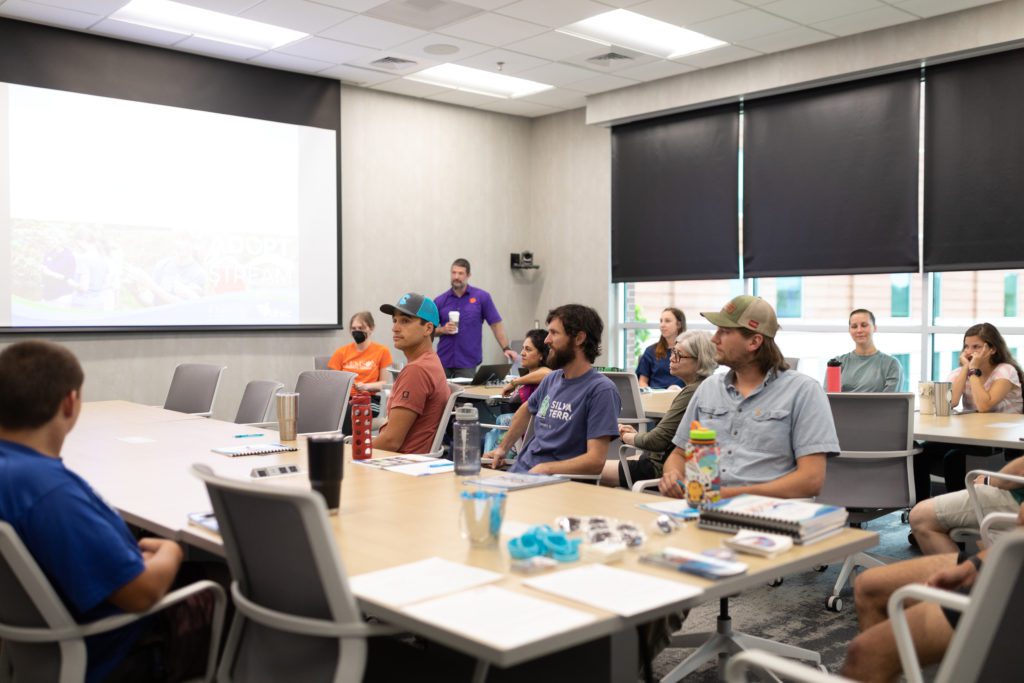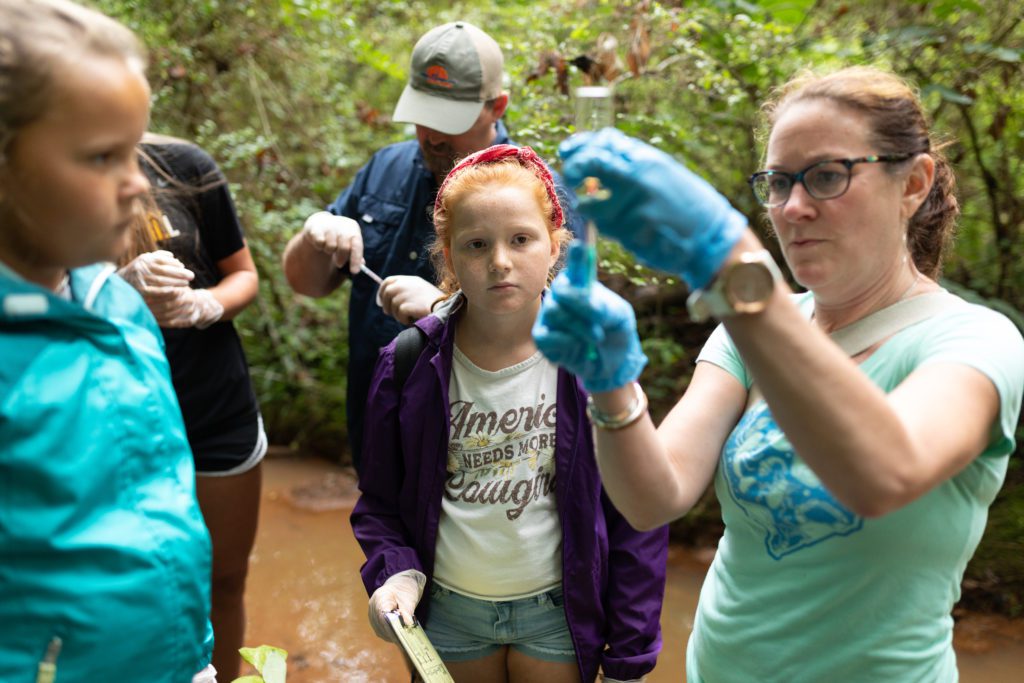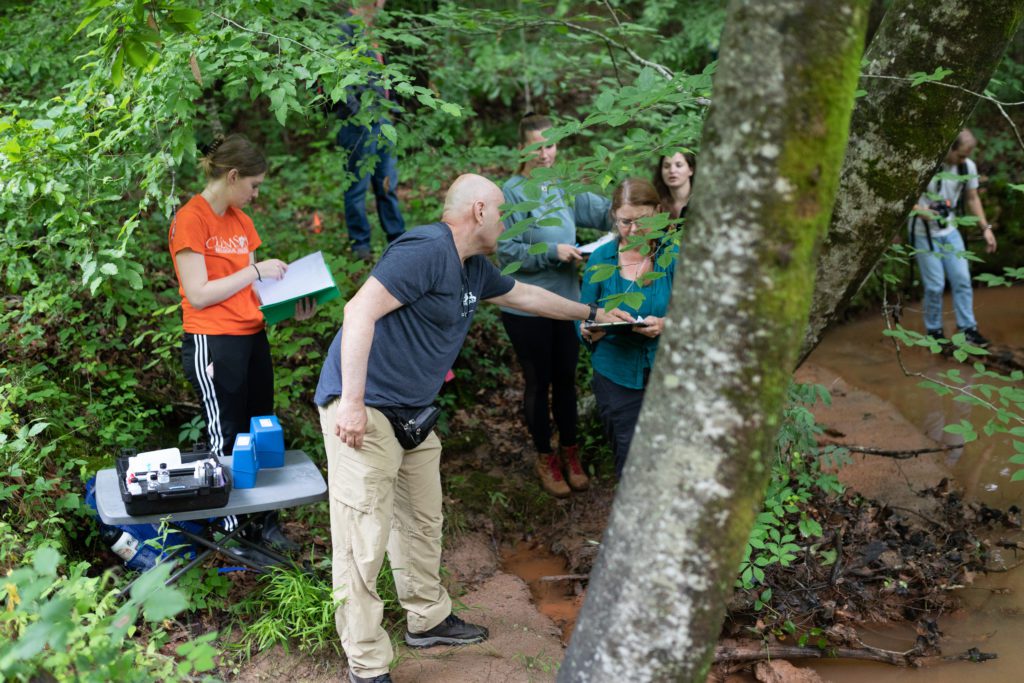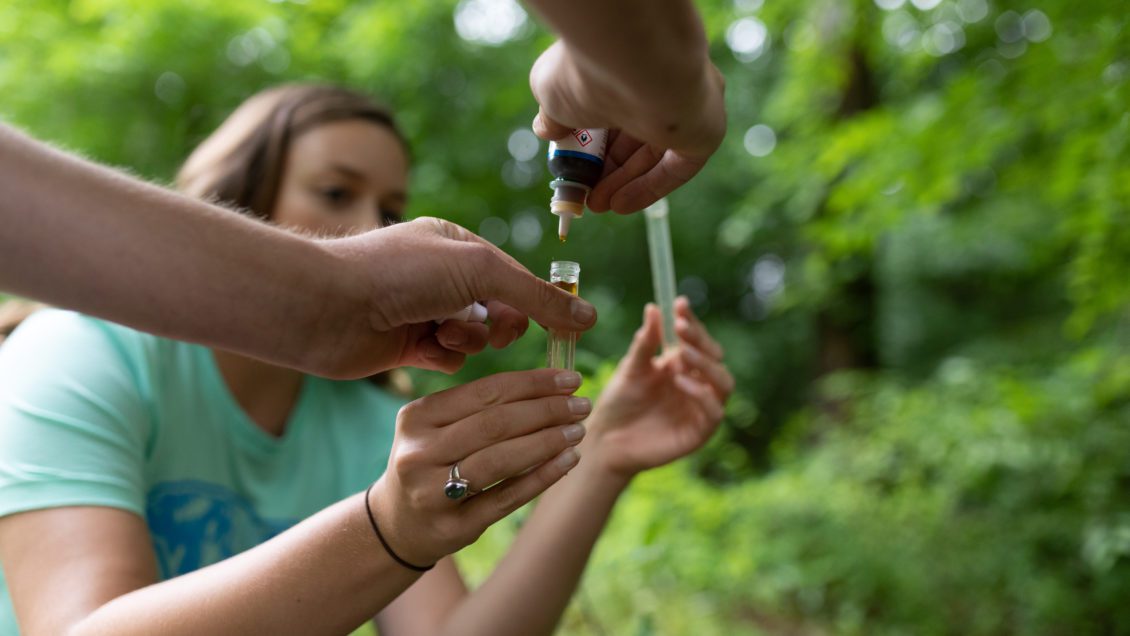The Palmetto State contains 30,000 miles of rivers and streams that drain water from its 20 million acres of land, according to the South Carolina Department of Natural Resources.
Along its inexorable journey to the Atlantic Ocean, some of that water is captured to sustain human, animal and plant life, and to fuel a statewide recreation and tourism industry that generated $24.4 billion in 2019. (Revenue generation from recreation and tourism fell to $16.2 billion in 2020 due to coronavirus pandemic.)
While South Carolina’s five major rivers — Savannah, Pee Dee, Catawba/Wateree, Edisto, and Saluda — carry a lot of that water, together they comprise only 1,159 miles of the 30,000 miles of South Carolina waterways. That leaves almost 29,000 miles of rivers and streams to supply water to households, municipalities, agriculture and industry.
Trey Burns knows full well the importance of those waterways to the health and wellbeing of South Carolinians
Burns is sustainability manager for the Anderson Regional Joint Water System (ARJWS), which pulls water from the Six and Twenty branch of Lake Hartwell and cleans it before distributing it to fifteen municipalities and water districts in Anderson and Pickens counties.
Since becoming ARJWS’s sustainability manager 5 years ago, Burns has relied on “citizen scientists” trained by the South Carolina Adopt-a-Stream Program to monitor creeks that flow into the lake.
The program — celebrating its fifth anniversary — is co-led by the South Carolina Department of Health and Environmental Control (DHEC) and Clemson’s Center for Watershed Excellence and, through many partnerships, creates a statewide network of trained residents focused on monitoring their local waterways for pollution. These residents then enter their data into a statewide database designed to openly share water quality data
“When I took this job 5 years ago, there was no water quality data from four creeks upstream that drain into Lake Hartwell — Hurricane Creek, Town Creek, Hembree Creek, and Six and Twenty Creek. Thanks to volunteers in the SC Adopt-a-Stream program, we now have 4 years of water quality data about those creeks, so if there is an issue, we can make more informed management decisions,” Burns said.

In June 2020, through his volunteer work with SC Adopt-A-Stream, Burns detected elevated bacteria levels in Hembree Creek, just 2 miles from where the AJWRS takes in water to be treated and distributed to households in the region.
During further sampling and investigation, a team from DHEC, AJWRS and Clemson University discovered a detached manhole cover and a broken 8-inch pipe that was pouring gray water into the creek. The pipe was fixed immediately.
“Without SC Adopt-A-Stream, who knows how long that pipe would have kept leaking. We were able to prevent many gallons of sewage from leaking into Hembree Creek and subsequently into Lake Hartwell,” Burns said.
Some might wonder why they should care. Afterall, groundwater is treated before we turn on the bathroom faucet and we use it to brush our teeth, right? That’s not always the case.
“If I ask people, ‘Where does that storm drain lead to,’ more than fifty percent think it leads to a treatment plant. But it doesn’t. It drains into a creek, a lake, and into our drinking water,” Burns said.
AJWRS Executive Director Scott Willett says SC Adopt-a-Stream is integral to his organization’s approach to trying to get the approximately 200,000 residents it serves to appreciate the value of clean and plentiful water.
“The cleaner the water is to start with, the easier it is to treat, and having as many citizens as possible protecting that resource is invaluable. SC Adopt-a-Stream allows us to have citizens throughout the basin help us maintain clean water. They’re monitoring a stream that is in their neighborhood. It is theirs. It attaches to them personally,” Willett said.
Since its inception in 2017, SC Adopt-a-Stream volunteers have monitored at nearly 3,000 monitoring events at 368 sites across the state. Observations made by these trained citizen scientists have sent more than 160 alerts out to the state and local authorities to report the potential of pollution. In all, volunteers have contributed $174,100 in volunteer time and mileage towards the improved management of conservation of water resources.

The program, led at Clemson by Katie Callahan, who directs the Center for Watershed Excellence, is part of a comprehensive statewide effort by Clemson University’s South Carolina Water Resources Center and Clemson Cooperative Extension — in collaboration with DHEC and other state agencies and municipalities — to understand how much water the state has, and how that water can be used sustainably and efficiently in the face of a population that has grown to 5.19 million and added 72,000 people in 2021.
“Citizen science is changing the way we manage our natural resources worldwide. More eyes and ears outside can share powerful observations that through programs like SC Adopt-a-Stream, activate local authorities when the threat of pollution is observed. Free trainings and a less complicated database of results and photos democratizes environmental health data and encourages more broad participation in the decisions that affect our environment’s vitality. We at the Center are grateful to be a player in such a powerful program for our state and waterways,” said Callahan.
A recent SC Adopt-a-Stream training at Tri-County Technical College in Pendleton attracted participants from all ages and backgrounds. There were parents and children wanting to learn to be good environmental stewards, retirees hoping to stay engaged with their community, ecotourism entrepreneurs looking to ensure the streams moving across their land remain pristine and members of the Clemson University Stream Team, a university club that samples streams on and around the Clemson campus.
One trainee was Rachel Kinsey, environmental coordinator at Milliken & Company’s textile finishing plant in Pendleton. The plant takes in water from Eighteen Mile Creek, which stretches from Easley through Pendleton and eventually drains into Lake Hartwell. The plant borrows water from the creek to dye and treat fabrics. The water is then filtered for 10 to 14 days before it is released back into the creek.
“We try to leave the water cleaner than it was when we took it in,” Kinsey said.
Kinsey works with DHEC to make sure water released by the Milliken treatment plant is clean and plans to use the skills she learned through SC Adopt-A-Stream to open testing to the public and report results to the plant’s environmental subcommittee.
“Milliken loves being involved in the community, so we want to be able to take tests at the treatment facility and open that up the public. Through SC Adopt-A-Stream, everyone in the community can know what’s going on in the water,” Kinsey said.
Water quality in Eighteen Mile Creek is not just a professional passion for Kinsey. It is also a personal one.
“My kids play in Eighteen Mile Creek. Other kids and their families do, too. I want to make sure that it’s safe, and I want the community to know that it’s safe,” she said.
SC Adopt-a-Stream’s spirit of volunteerism can be found in trainers as well as students like Kinsey.
Gerardo Naundorf, Ph.D., is a biologist with a specialization in environmental microbiology originally from Columbia, South America.

Naundorf had been a university professor for 35 years working in the field of water quality. When he came to the United States, he was looking for something he could participate in that was related to his expertise. At that time the state of Georgia had an Adopt-A-Stream program but not South Carolina.
When SC Adopt-A-Stream started in 2017, Naundorf, who lives in Greenville, took the opportunity to utilize his many years of scientific expertise to become a SC Adopt-A-Stream trainer.
“It’s a beautiful program because it gives the citizens the opportunity to help the authorities, the people who work in the regulatory system, to provide data and information about the quality of the water in their streams, creeks, and rivers, where they live. This is a wonderful opportunity and provides really good data about how our water ecosystems work, and helps to keep our water clean,” Naundorf said.
While Naundorf has a deep background in water quality, he emphasizes that volunteering doesn’t require any special knowledge, just a desire to contribute to community wellbeing and a love of the outdoors.
“The water testing protocols that we use in the program are not rocket science. They are basic science that anyone can do. It’s very simple and you get to enjoy the outdoors,” he said.
Naundorf himself helped avert a potential water quality crisis near the North Saluda River. While on a cycling outing in Travelers Rest, he noticed unusual odors and excessive sediment in a stream near Les Mullinax Park. The stream had the odor of gasoline and pesticides. Naundorf sent photos of the site to the SC Adopt-a-Stream staff who then alerted officials with the Greenville office of DHEC. DHEC discovered that there were drainage ditches coming from agricultural land behind the park and the owner of the land installed silt fencing along the ditches to prevent the water from becoming further contaminated.
While SC Adopt-a-Stream relies primarily on volunteers for its training and water quality sampling, the program is also supported by the Clemson Cooperative Extension Service, which is tasked with providing research-based information to the citizens of South Carolina through an array of programs including a program in Water Resources.
Steven O’Shields is a Clemson Extension Water Resources Agent located in Anderson County. O’Shields’ primary responsibilities include meeting with area landowners to help them solve problems with their ponds and working with Anderson County and the City of Anderson on water quality education and outreach. But O’Shields also serves as a SC Adopt-a-Stream trainer.
“Anderson County stormwater does not go to a treatment plant. It makes its way into our waterways, picking up contaminants along the way That’s why the SC Adopt-a-Stream program is so important. The data that’s collected by volunteers is used by the state’s regulatory agencies to help ensure our water stays safe and clean. Volunteers learn a lot in the process and also become part of an active community protecting a shared, vital resource,” O’Shields said.
Get in touch and we will connect you with the author or another expert.
Or email us at news@clemson.edu

